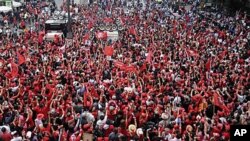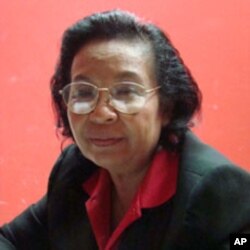Efforts in Thailand to promote reconciliation have continued months after the military ended anti-government protests. The opposition movement, known as the Red Shirts, is preparing for the general elections next year, despite divisions among its members.
Central Bangkok's Rajaprasong commercial district, the scene of bitter anti-government protests this year, recently was transformed by a symphony performance.
Thai composer Somtow Sucharitkul conducted the "The Mahajananaka" originally performed a decade ago for Thailand's king, as another step in community efforts to heal deep political divisions in left after the military destroyed a protest camp in this area last May.
The political violence, the most severe Thailand has seen in 20 years, left 90 people dead and hundreds injured.
"Well there is an enormous amount of anger and the whole concept of winning and losing and coming back, it's not deeply engrained in our culture. This is a culture that in the past has been really driven by the idea of vengeance in many ways and this is something that we have to overcome. I feel that if well I can't do it with words perhaps I can do it with music," said Somtow.
The protesters, known as red shirts, largely support former Prime Minister Thaksin Shinawatra, who was ousted in a coup in 2006. They demanded new elections, saying the current government was put in place by the military and Bangkok elites after elected governments were ousted by the courts.
After the protests were crushed, most red shirt leaders were either arrested or fled the country. But a new leadership has taken over the movement, directed by Thida Thavornseth, whose husband, Weng Tojirakan, is among the jailed red shirts.
Thida says the new leaders hope the movement remains peaceful.
"We, the people and especially the red shirt people, want to keep in a group and move [in a way] that is good for the red shirt and for the country also. We want to keep peaceful movement, otherwise the democracy movement - our democracy movement - may be destroyed because of some people want to destroy peaceful movement," she said.
But Thida has doubts about the government's attempts at reconciliation. Official investigations so far have been inconclusive as to who was responsible for the violence.
"I'm not sure about the reconciliation. I'm not sure. The first thing you have to find the truth, the truth and justice for the people. Then you can go to reconciliation," she said.
The red shirts generally support the opposition Puea Thai Party, of which Thaksin is the unofficial leader. But Thida hopes to set the movement on a more independent path.
Chris Baker, an author and commentator on Thai politics and business, says the red shirt movement, originally designed to promote Thaksin and return him to power, has become increasingly divergent.
"Lots of stresses and strains within different political groupings within the overall red umbrella; It's a very broad church with lots of different agendas within it now. But political movements are like that. But it's a genuine movement unlike almost anything you've seen before," said Baker.
But Baker says the red shirt's main focus is the general election due next year.
Over the past few weeks, the opposition lost its last chance to oust the current government through the courts. Judges dismissed two cases alleging election improprieties against the Democrat Party of Prime Minister Abhisit Vejjajiva. Had the courts ruled the party was guilty, it would have been disbanded and its leaders banned from politics for five years.
Thailand remains politically brittle, with Bangkok still under a state of emergency nine months after it was imposed, giving the military wide powers to control the media and limit public gatherings. Baker and others say the divisions among the red shirts make the outlook increasingly uncertain.














